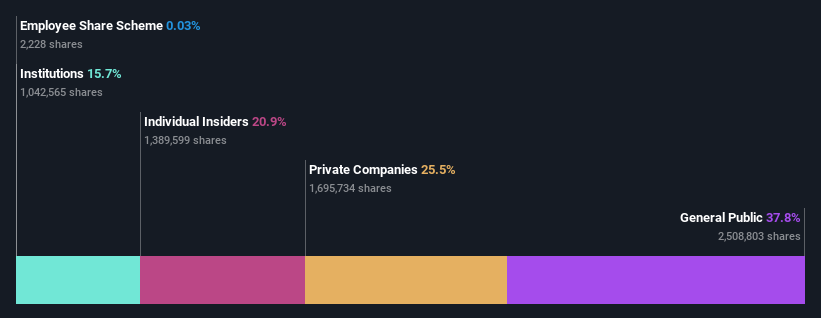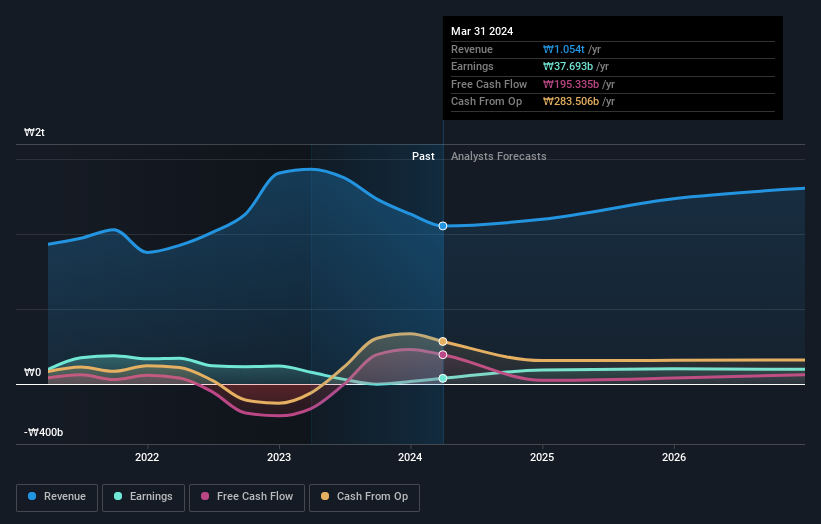Stock Analysis
- South Korea
- /
- Chemicals
- /
- KOSE:A014830
Retail investors among UNID Company Ltd.'s (KRX:014830) largest stockholders and were hit after last week's 12% price drop

Key Insights
- The considerable ownership by retail investors in UNID indicates that they collectively have a greater say in management and business strategy
- The top 6 shareholders own 50% of the company
- 21% of UNID is held by insiders
A look at the shareholders of UNID Company Ltd. (KRX:014830) can tell us which group is most powerful. And the group that holds the biggest piece of the pie are retail investors with 38% ownership. Put another way, the group faces the maximum upside potential (or downside risk).
And following last week's 12% decline in share price, retail investors suffered the most losses.
Let's delve deeper into each type of owner of UNID, beginning with the chart below.
Check out our latest analysis for UNID

What Does The Institutional Ownership Tell Us About UNID?
Institutional investors commonly compare their own returns to the returns of a commonly followed index. So they generally do consider buying larger companies that are included in the relevant benchmark index.
As you can see, institutional investors have a fair amount of stake in UNID. This implies the analysts working for those institutions have looked at the stock and they like it. But just like anyone else, they could be wrong. If multiple institutions change their view on a stock at the same time, you could see the share price drop fast. It's therefore worth looking at UNID's earnings history below. Of course, the future is what really matters.

Hedge funds don't have many shares in UNID. Looking at our data, we can see that the largest shareholder is UNID Global Corporation with 26% of shares outstanding. With 9.5% and 5.9% of the shares outstanding respectively, Wha-Young Lee and National Pension Service are the second and third largest shareholders.
We did some more digging and found that 6 of the top shareholders account for roughly 50% of the register, implying that along with larger shareholders, there are a few smaller shareholders, thereby balancing out each others interests somewhat.
While it makes sense to study institutional ownership data for a company, it also makes sense to study analyst sentiments to know which way the wind is blowing. Quite a few analysts cover the stock, so you could look into forecast growth quite easily.
Insider Ownership Of UNID
While the precise definition of an insider can be subjective, almost everyone considers board members to be insiders. Company management run the business, but the CEO will answer to the board, even if he or she is a member of it.
Most consider insider ownership a positive because it can indicate the board is well aligned with other shareholders. However, on some occasions too much power is concentrated within this group.
Our information suggests that insiders maintain a significant holding in UNID Company Ltd.. Insiders own ₩142b worth of shares in the ₩678b company. It is great to see insiders so invested in the business. It might be worth checking if those insiders have been buying recently.
General Public Ownership
With a 38% ownership, the general public, mostly comprising of individual investors, have some degree of sway over UNID. While this group can't necessarily call the shots, it can certainly have a real influence on how the company is run.
Private Company Ownership
We can see that Private Companies own 26%, of the shares on issue. It's hard to draw any conclusions from this fact alone, so its worth looking into who owns those private companies. Sometimes insiders or other related parties have an interest in shares in a public company through a separate private company.
Next Steps:
It's always worth thinking about the different groups who own shares in a company. But to understand UNID better, we need to consider many other factors. For example, we've discovered 2 warning signs for UNID that you should be aware of before investing here.
If you would prefer discover what analysts are predicting in terms of future growth, do not miss this free report on analyst forecasts.
NB: Figures in this article are calculated using data from the last twelve months, which refer to the 12-month period ending on the last date of the month the financial statement is dated. This may not be consistent with full year annual report figures.
Valuation is complex, but we're helping make it simple.
Find out whether UNID is potentially over or undervalued by checking out our comprehensive analysis, which includes fair value estimates, risks and warnings, dividends, insider transactions and financial health.
View the Free AnalysisHave feedback on this article? Concerned about the content? Get in touch with us directly. Alternatively, email editorial-team (at) simplywallst.com.
This article by Simply Wall St is general in nature. We provide commentary based on historical data and analyst forecasts only using an unbiased methodology and our articles are not intended to be financial advice. It does not constitute a recommendation to buy or sell any stock, and does not take account of your objectives, or your financial situation. We aim to bring you long-term focused analysis driven by fundamental data. Note that our analysis may not factor in the latest price-sensitive company announcements or qualitative material. Simply Wall St has no position in any stocks mentioned.
Valuation is complex, but we're helping make it simple.
Find out whether UNID is potentially over or undervalued by checking out our comprehensive analysis, which includes fair value estimates, risks and warnings, dividends, insider transactions and financial health.
View the Free AnalysisHave feedback on this article? Concerned about the content? Get in touch with us directly. Alternatively, email editorial-team@simplywallst.com
About KOSE:A014830
UNID
Manufactures and sells potassium based chemical products in South Korea and internationally.
Flawless balance sheet second-rate dividend payer.

